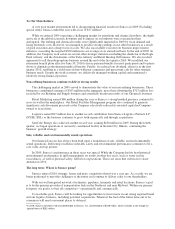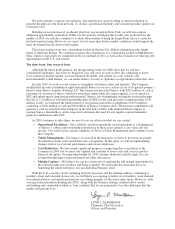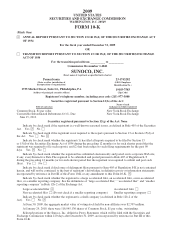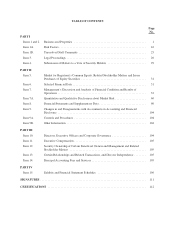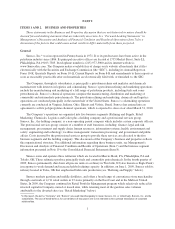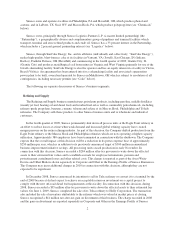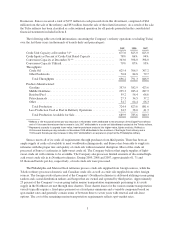Sunoco 2009 Annual Report Download - page 13
Download and view the complete annual report
Please find page 13 of the 2009 Sunoco annual report below. You can navigate through the pages in the report by either clicking on the pages listed below, or by using the keyword search tool below to find specific information within the annual report.settled certain alleged violations under the Clean Air Act. Additional capital outlays totaling approximately
$215 million related to projects at the Marcus Hook refinery are expected to be made under the 2005 Consent
Decree prior to 2014. The current status of these capital projects ranges from the preliminary design and
engineering phase to the construction phase. The Refining and Supply capital plan for the 2008-2009 period also
included a project at the Philadelphia refinery to reconfigure a previously idled hydrocracking unit to enable
desulfurization of diesel fuel. This project, which was completed in 2009 at a cost of $200 million, increased the
facility’s ultra-low-sulfur diesel fuel production capability by 45 thousand barrels per day by upgrading current
production of 35 thousand barrels per day of temporary compliance order diesel fuel (TCO) and 10 thousand
barrels per day of heating oil.
In May 2007, Refining and Supply completed a $525 million project to expand the capacity of one of the
fluid catalytic cracking units at the Philadelphia refinery by 15 thousand barrels per day, which enables an
upgrade of an additional 15-20 thousand barrels per day of residual fuel production into higher-value gasoline
and distillate production and expands crude oil flexibility. Refining and Supply’s capital program also included a
$53 million project completed in July 2007 which expanded the Toledo refinery’s crude processing capability by
10 thousand barrels per day. In 2008, additional work was performed at this facility to expand crude processing
capability by an additional 5 thousand barrels per day.
Refining and Supply has undertaken an alkylation process improvement project at its Philadelphia refinery’s
HF alkylation unit. The project will involve the incorporation of ReVAP™ technology which will require
substantial improvements and modifications to the alkylation unit and supporting utility systems. The project is
scheduled for completion during 2010 at an estimated cost of approximately $115 million.
In September 2004, Refining and Supply entered into a 15-year product supply agreement with BOC
Americas (PGS), Inc. (“BOC”), an affiliate of The BOC Group plc. Under this agreement, Refining and Supply is
providing BOC with feedstock and utilities for use by BOC at its hydrogen plant located on land leased from
Refining and Supply at the Toledo refinery which commenced operations in March 2006. BOC utilizes the
feedstock and utilities to generate hydrogen and steam at the facility for sale to Refining and Supply for use at its
Toledo refinery and for sale to another third party.
Refining and Supply and a subsidiary of FPL Energy (“FPL”) are parties to an agreement under which
Refining and Supply may purchase steam from a natural gas fired cogeneration power plant owned and operated
by FPL at Sunoco’s Marcus Hook refinery. When the cogeneration plant is in operation, Refining and Supply has
the option to purchase steam from that facility or, alternatively, it obtains steam from Refining and Supply’s four
auxiliary boilers located on land adjacent to the power plant that are operated by FPL on its behalf.
Retail Marketing
The Retail Marketing business consists of the retail sale of gasoline and middle distillates and the operation
of convenience stores in 23 states, primarily on the East Coast and in the Midwest region of the United States.
The highest concentrations of outlets are located in Connecticut, Florida, Maryland, Massachusetts, Michigan,
New Jersey, New York, Ohio, Pennsylvania and Virginia.
5


